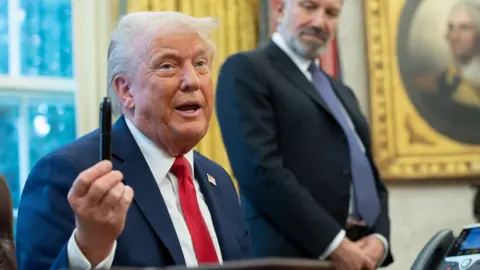Judge blocks Trump's bid to restrict birthright citizenship
 Getty Images
Getty ImagesA US federal judge has blocked Donald Trump's attempt to end birthright citizenship for children born to parents who are in the country illegally or temporarily.
"Today, virtually every baby born on US soil is a US citizen upon birth," Maryland district Judge Deborah Boardman ruled. "That is the law and tradition of our country."
The ruling extends the existing pause on Trump's 20 January executive order until the legal process plays out, which could take months or even years.
It comes two weeks after a federal judge in Seattle called Trump's order "blatantly unconstitutional" and issued a 14-day restraining order. The judge will hold another hearing when that ruling expires on Thursday.
The Trump administration can appeal against the ruling and is expected to do so, say experts.
Ending birthright citizenship is part of President Trump's drive to remove illegal immigrants from the US.
His order, which was scheduled to come into effect on 19 February, would have withheld automatic citizenship rights from newborns if neither of their parents was a US citizen or lawful permanent resident.
On Wednesday, Judge Boardman ruled that Trump's order "runs counter to our nation's 250-year history of citizenship by birth".
"The United States Supreme Court has resoundingly rejected the president's interpretation of the Citizenship Clause of the 14th Amendment," she said. "In fact, no court in the country has ever endorsed the president's interpretation. This court will not be the first."
At the heart of the case is the interpretation of the 14th Amendment to the US Constitution, adopted shortly after the Civil War, which states in part: "All persons born or naturalized in the United States, and subject to the jurisdiction thereof, are citizens of the United States".
The Trump administration argues that the clause excludes children of non-citizens who are in the US unlawfully, and added that the order is "an integral part" of the president's goal to address the country's "broken immigration system and the ongoing crisis at the southern border".
Since the late 19th Century the constitutional amendment has been interpreted by courts including the US Supreme Court as automatically granting citizenship rights to children born on US soil, with a few exceptions such as the children of diplomats.
But conservatives have long argued birthright citizenship is a magnet for illegal immigration and is being exploited through birth tourism, where individuals come to the US to have a child who will become an American citizen.
The Maryland challenge to the executive order was brought by two immigrant rights groups that filed the lawsuit on behalf of five pregnant women.
In a statement after the judge's ruling, one of the pregnant woman said the decision "will give mothers like me a bit of temporary relief as we navigate pregnancy and the uncertain future for our babies".
The woman, who was identified by the pseudonym Trinidad Garcia, also said: "All I have wanted is to focus on my baby being born healthy and safe, but instead, even though my baby will be born in the US, I have been worried that they will be denied a right is that guaranteed under the constitution - the right to be a US citizen".
According to 22 Democratic state attorneys general who have brought lawsuits to stop Trump's policy, more than 150,000 babies would be denied citizenship each year under the executive order.
An additional hearing - for a case that involves more than a dozen states challenging Trump's order - is scheduled for Friday in Massachusetts.
